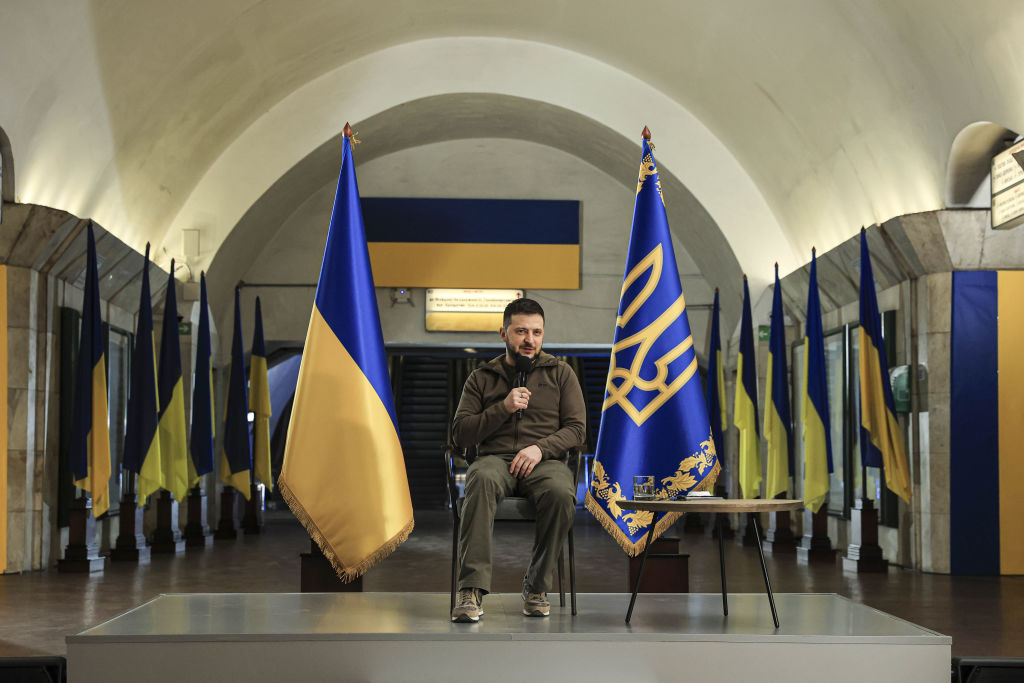
Ukrainian President Volodymyr Zelensky said that U.S. Secretary of State Antony Blinken and Defense Secretary Lloyd Austin would visit Kyiv on Sunday, in what would be a risky show of support for Ukraine’s defense against Russia’s invasion.
“Tomorrow people from the U.S. are coming, I will meet the defense minister and the secretary of state, Mr. Blinken,” Zelensky said in a news conference on Saturday. “I think we will be waiting when security will allow the president of the U.S. to come and support Ukraine’s people.”
It wasn’t clear if Zelensky’s disclosure was cleared with the Biden administration or if it would affect any travel plans. The White House National Security Council declined to comment and the State Department did not immediately comment.
The U.S. government typically does not announce trips to active combat zones by senior officials until they are already on the ground or departing the area.
The visit, if confirmed, would be the first by top U.S. officials to Ukraine’s capital since Russia invaded the country on Feb. 24. In March, Blinken briefly met with Ukraine’s foreign minister at the Ukraine-Polish border.
U.K. Prime Minister Boris Johnson, European Commission President Ursula Von Der Layen and other foreign leaders have previously visited Kyiv to show support for the Ukrainian government.
Those trips raised pressure on the U.S. to schedule a visit by President Joe Biden or other senior officials. The White House has said there were no plans for Biden to visit the war-torn country.
The war in Ukraine has entered a new phase as Russia shifts its forces to the east and south after failing to take Kyiv or topple Zelensky’s government in the early weeks of the conflict.
With Russian President Vladimir Putin showing no signs of backing down as the conflict enters its third month, the U.S. and European allies have continued to ratchet up sanctions on Moscow and accelerate the delivery of weapons to Ukraine.
At the same time, peace talks between Russia and Ukraine have ground to a halt and the humanitarian situation has grown more dire. The United Nations refugee agency this week said more than 5 million people have fled Ukraine.
In the port city of Mariupol, which Putin has said is effectively under Russian control after weeks of devastating fighting, Ukrainian officials say about 100,000 civilians remain.
Russian forces resumed airstrikes in their latest attempt to dislodge Ukrainian fighters holed up at Mariupol’s Azovstal steel plant, Ukrainian presidential spokesman Oleksiy Arestovych said on Saturday.
Biden this week pledged an additional $1.3 billion in weaponry and economic aid, adding to an $800 million package announced last week that included heavy artillery for the first time, as well as additional helicopters. The latest aid shipments will include dozens of howitzers, 144,000 rounds for the weapons and attack drones.
The U.S. president said he would also send a formal request to Congress for more funding in order to keep up shipments of military equipment and weapons to Ukraine. Congressional leaders said they would begin considering the funding package as soon as next week.
Zelensky and his aides have repeatedly pressured the U.S. and its Western allies to send more weaponry and ramp up sanctions on Russia in order to weaken Putin’s resolve. Ukraine says it’s already inflicted dramatic losses on Russia’s military, including the sinking of its flagship Black Sea warship last week, and forced Moscow to retreat from an assault on Kyiv.
The Kremlin has not been transparent about Russian casualties in the war. NATO estimated last month that Russia had seen as many as 15,000 soldiers killed, with tens of thousands more wounded or captured.
Biden last month visited U.S. troops stationed in Poland about an hour’s drive from the Ukrainian border during a four-day trip to Europe but he did not cross into Ukraine. The president previously alluded to staff concerns about security as the reason he did not enter Ukraine.
–With assistance from Peter Martin.
More Must-Reads from TIME
- Cybersecurity Experts Are Sounding the Alarm on DOGE
- Meet the 2025 Women of the Year
- The Harsh Truth About Disability Inclusion
- Why Do More Young Adults Have Cancer?
- Colman Domingo Leads With Radical Love
- How to Get Better at Doing Things Alone
- Michelle Zauner Stares Down the Darkness
Contact us at letters@time.com